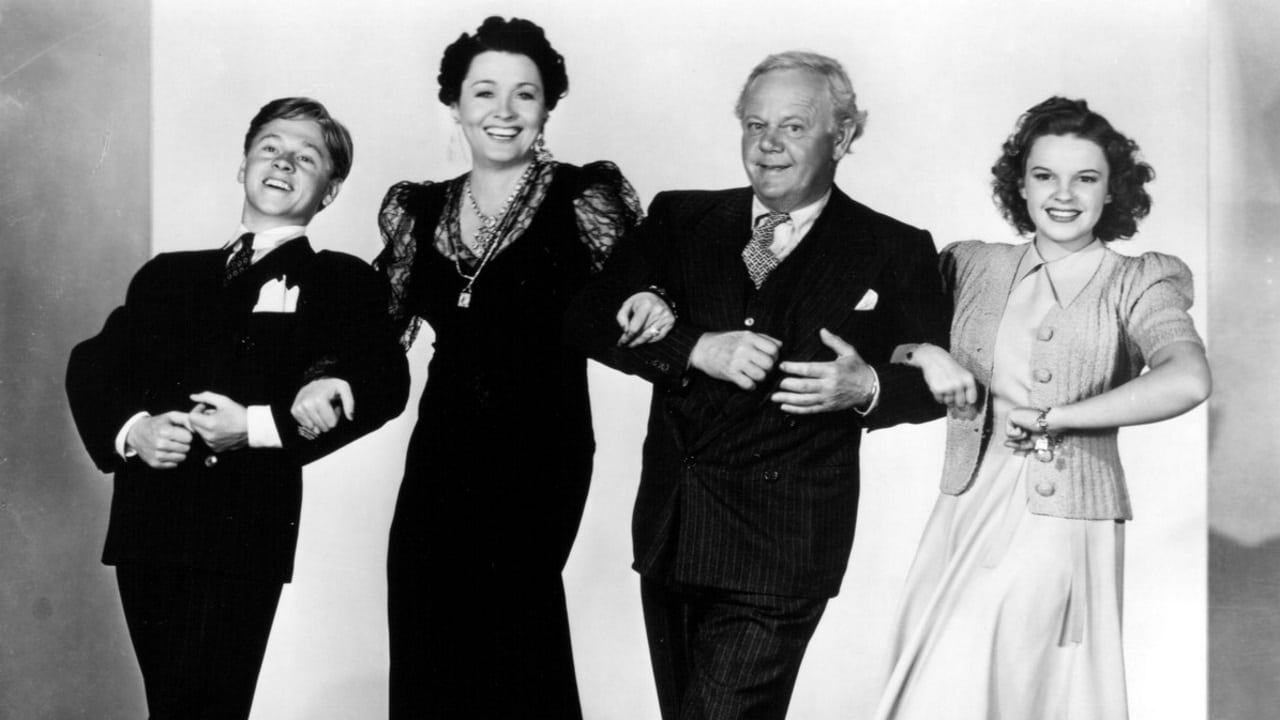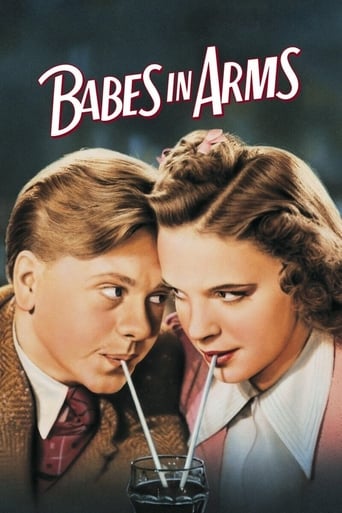Ensofter
Overrated and overhyped
Chirphymium
It's entirely possible that sending the audience out feeling lousy was intentional
ChicDragon
It's a mild crowd pleaser for people who are exhausted by blockbusters.
ChanFamous
I wanted to like it more than I actually did... But much of the humor totally escaped me and I walked out only mildly impressed.
Sober-Friend
The story for this film is that Mickey Moran (Mickey Rooney) and Patsy Barton (Judy Garland) are aspiring entertainers and the children of vaudeville performers. Vaudeville has lost its popularity do to movies! Mickey and Patsy's parents are are trying bringback Vaudeville but they are failing . Now Mickey and Patsy now decide to produce their own show in a bid to reach their dreams of stage stardom and save their homes and not end up in a work camp!.I am not sure if this the first movie that has the plot of "Let's Save the ______" by putting on a show. Now the best musical number is at the begging of the film and its the "Good Morning" number. What is great about this number is that is just "Judy" and "Mickey". No fireworks or special effects. ITs two very talented people and a piano.
Other numbers in this film range only from "Barely Tolerable" to "Awful". Worth watching once. Funny thing is that this film made more money (At The Time) than "The Wizard of Oz"
Matt Greene
My real-time thoughts while watching the movie:Garland and Rooney were so talented even at a young age - Music performances are great, both the vaudeville and Busby Berkley numbers. - Its philosophy is childish (telling Native Americans to dance away their sadness), but it's kinda fitting for its juvenile subjects. - What kid wouldn't like this, young people rebelling against ignoring & discouraging parents? - …AAAAANNNNNNDDD, a parade of blackface. So offensive and insensitive it's almost laughable…almost.
calvinnme
Mickey Rooney plays the son of vaudevillian parents, most of whom have decamped to Long Island. Vaudeville is dead now that it's 1939, but Mickey has performing in his blood, even selling the song "Good Morning" which is original to this movie. (Arthur Freed, who wrote the lyrics, would later reuse it in Singin' in the Rain.) When Mickey finds out that Margaret Hamilton is going to evict the underemployed vaudevillians and send their kids off to work schools, he vows to put on a show to bring in the money. He does with with the help of Judy Garland and June Preisser among others (watch for a young Johnny Sheffield).Some of the musical numbers are interesting, such as one with all the young folks marching through town and starting a bonfire. And then there's the blackface number that's the bulk of the show Mickey writes. It's almost as nuts as the one Joan Crawford does in Torch Song, except that the later movie is in Technicolor and gets to show off Crawford's hair. There's also the finale, that has Mickey and Judy doing their impressions of Franklin and Eleanor Roosevelt respectively.Mickey also gets to do an impression of Lionel Barrymore (not too successfully), and Clark Gable (absolutely hilarious). Mickey is determined and almost manic, to the point I half expected him to exclaim, "As God is my witness, I'll never go hungry again!" This movie would normally be a 7/10, but Mickey Rooney's 9/10 performance raises it to an 8/10 for me.
mark.waltz
Warner Brothers took the Dead End Kids and taught them the law. MGM simply gave their teen brigade and gave them tap shoes. Those teens are lead by the rambunctious Mickey Rooney and the peppy but vulnerable Judy Garland who sang and danced their way into the hearts of the world with this schmaltzy but energetic musical. Loosely based upon the 1937 Broadway hit, it lacks many of the original Rodgers and Hart songs in favor of an original score by Roger Edens. The basic plot remains concerning the children of traveling vaudevillians who decide to put on their own show in order to avoid reform school. In the process, buddies Garland and Rooney discover adolescent love in spite of his distraction by a perky former child star. The duo's real life starts in vaudeville correlates with their character's, giving it a bit of irony. Rooney received his first Oscar Nomination for this, basically a continuation of what he had already been doing with the Andy Hardy series. The only difference is here, he sings and dances, quite remarkably, yet with all of the incredible performances in 1939, his inclusion really gives me this reaction: ? As for Garland, she gives a truly versatile performance, combining tenderness and spunk, never hamming it up yet winning attention by commanding it, not demanding it. She truly steals your heart when she sings "I Cried for You", a solo equal in power to Over the Rainbow from the same year's "The Wizard of Oz". In an odd historical note, Garland was not nominated for an Oscar for either film, although a supporting performance by Greer Garson in "Goodbye Mr. Chips" was.Musically, only the title song and "Where or When" remain from the stage show which is on rare occasions still revived. A studio cast album shows that the cut songs deserved better recognition than they got here. Obviously, Garland didn't get to sing the show's most famous song, "The Lady is a Tramp" which is still heard as background music without the racy lyrics. Lena Horne did perform it in the Rodgers and Hart bio-pic, Words and Music. The title number is a highlight, although in retrospect, the group seems self serving, unrealistic and destructive in starting a bonfire. The over-stuffed minstrel show has raised eyebrows with its black-face segments, while the patriotic finale is like something you'd never see on Broadway, let alone in a small-town barn. Elements of both numbers are very dated. The constant close-ups of diaper clad tots may make you gag after a few seconds. Garland and Rooney are a fine team and certainly share much chemistry. Douglas McPhail and Betty Jaynes provide noble support, while June Preisser is the Kristen Chenoweth of her era. Guy Kibbee is a kindly judge and Margaret Hamilton is a well- meaning town matron who only a few months later would taunt Judy once again, albeit in green make-up. Busby Berkeley takes the elaborate choreography and military like drill marching but lacks the camp of earlier musicals and a later banana clad Carmen Miranda.

